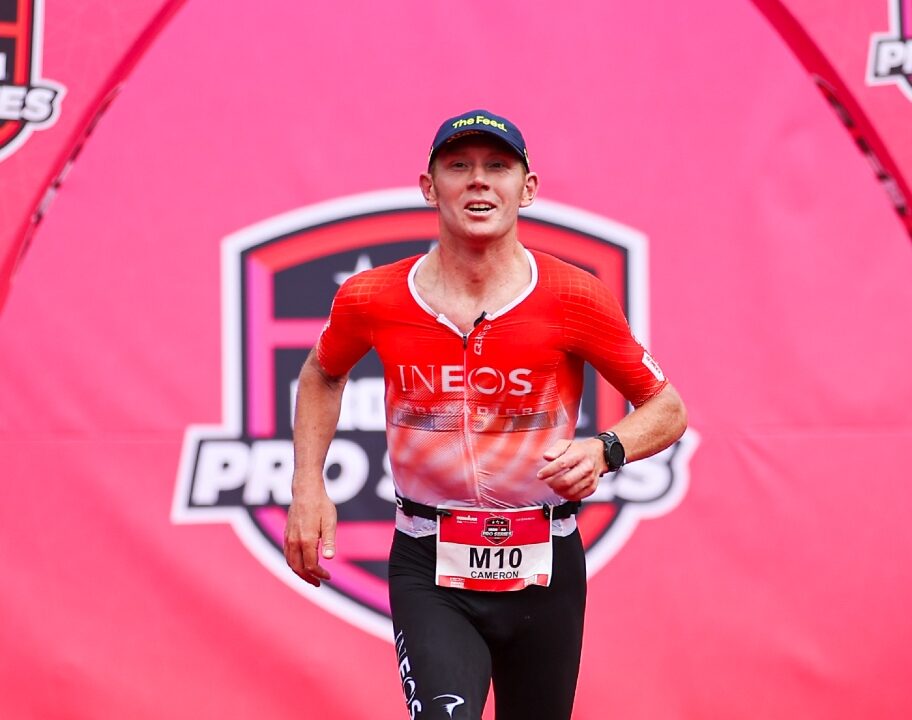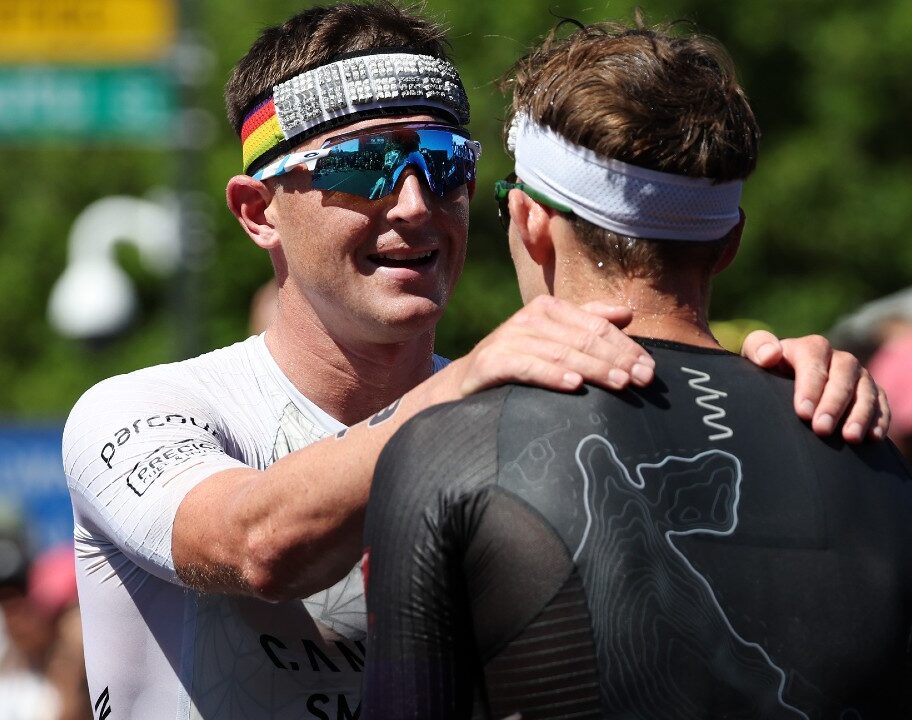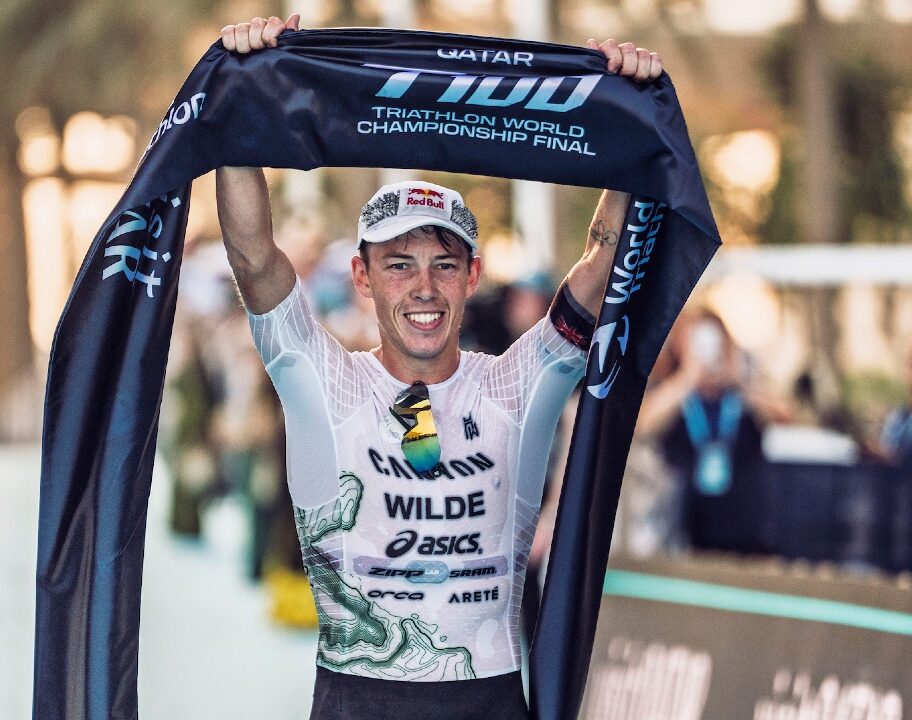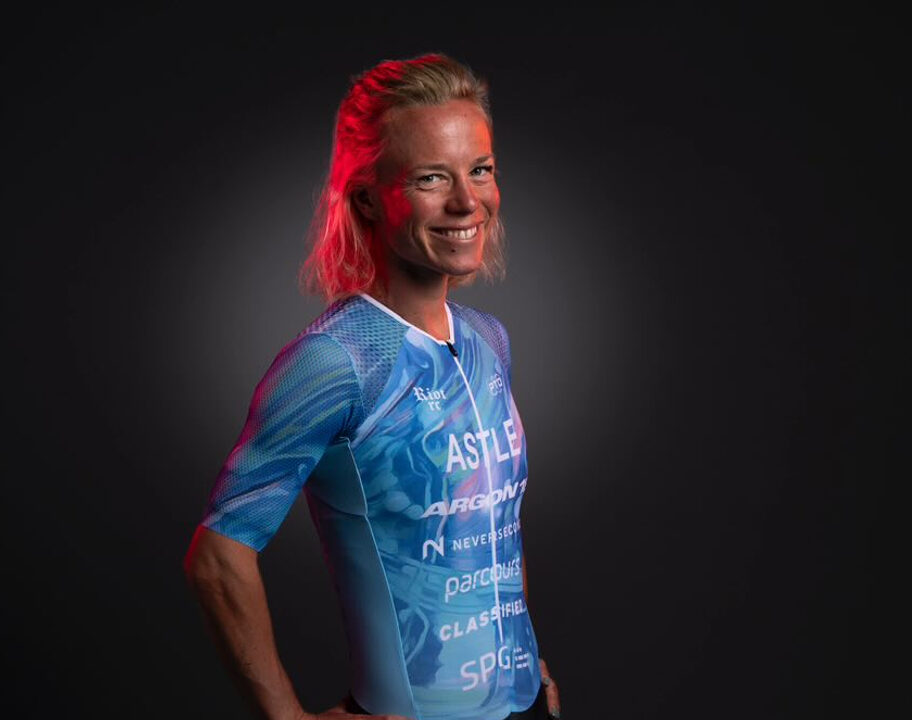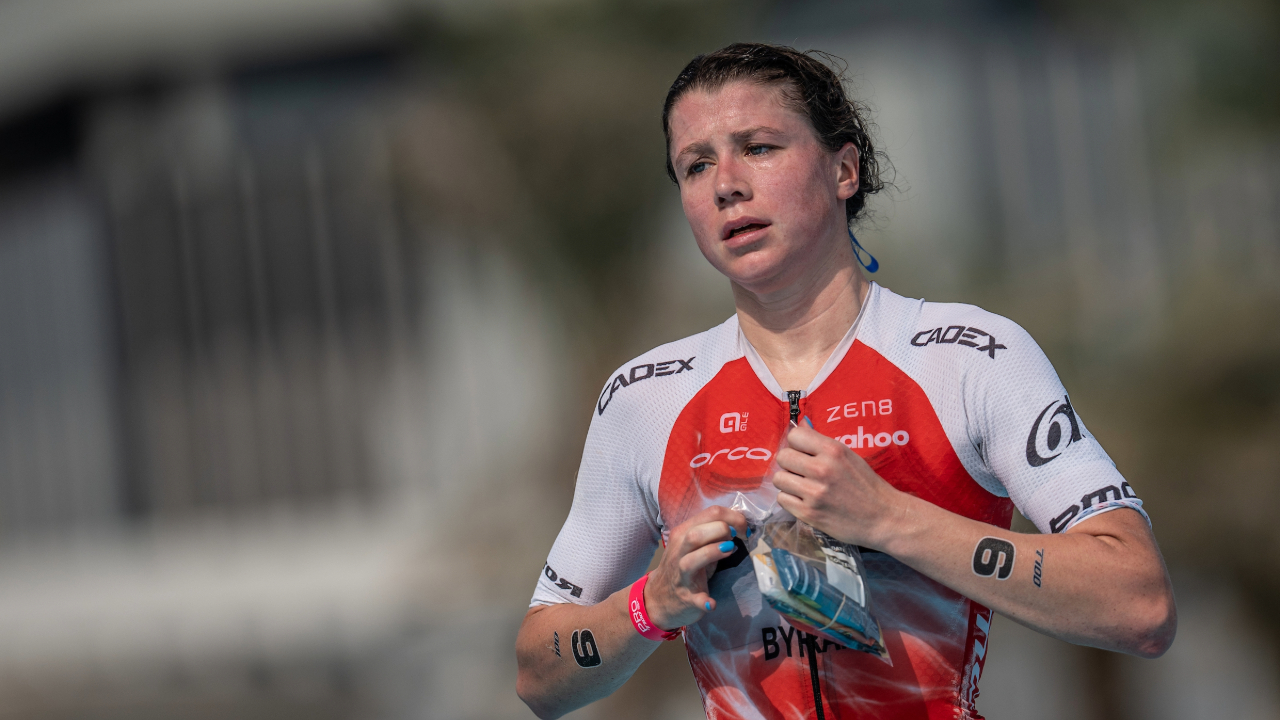CEO Sam Renouf and the Professional Triathletes Organisation have apologised to all the athletes involved in a chaotic finish to the men’s race at Dubai T100 last Saturday.
No fewer than 13 of the 17 finishers completed a lap too few on the 18km run – in a race which had already been blighted by the leading three athletes doing an extra 8km lap of the bike course.
There was complete confusion at the end of the run and after a considerable delay it was announced that the result from the last timing point at the end of lap seven of eight would determine the final result.
Thankfully that at least meant Morgan Pearson, who was one of the four men to run the full eight laps and appeared on course for victory, claimed a first T100 success.
‘We take full responsibility’
But many questions remained to be answered and we have sat down with Renouf to get a clear idea of exactly what unfolded, why failures occurred and what led to the decision-making process afterwards.
Marten Van Riel, the reigning T100 World Champion, was one of the first to post what must have been a devastating critique to the PTO, followed by a lengthier statement which he concluded by saying: “I hope that by sharing my experience, we can continue learning and improving the sport together.”
And Renouf was keen first of all to acknowledge that as he told us: “We’ve spoken to Marten and all the athletes and apologised for the technical problems that occurred during the run on the men’s race in Dubai – and we are also sorry for the disruption caused to the fans, media and sponsors who were watching at the event and around the world on TV.
“We respect the athletes that have spoken out on social media, as their voices and support are crucial as we continue to work hard to develop the sport.
“We take full responsibility for what happened at the end of the run and we will take the learnings into our next race in Qatar and put in place measures to ensure this doesn’t happen again.”
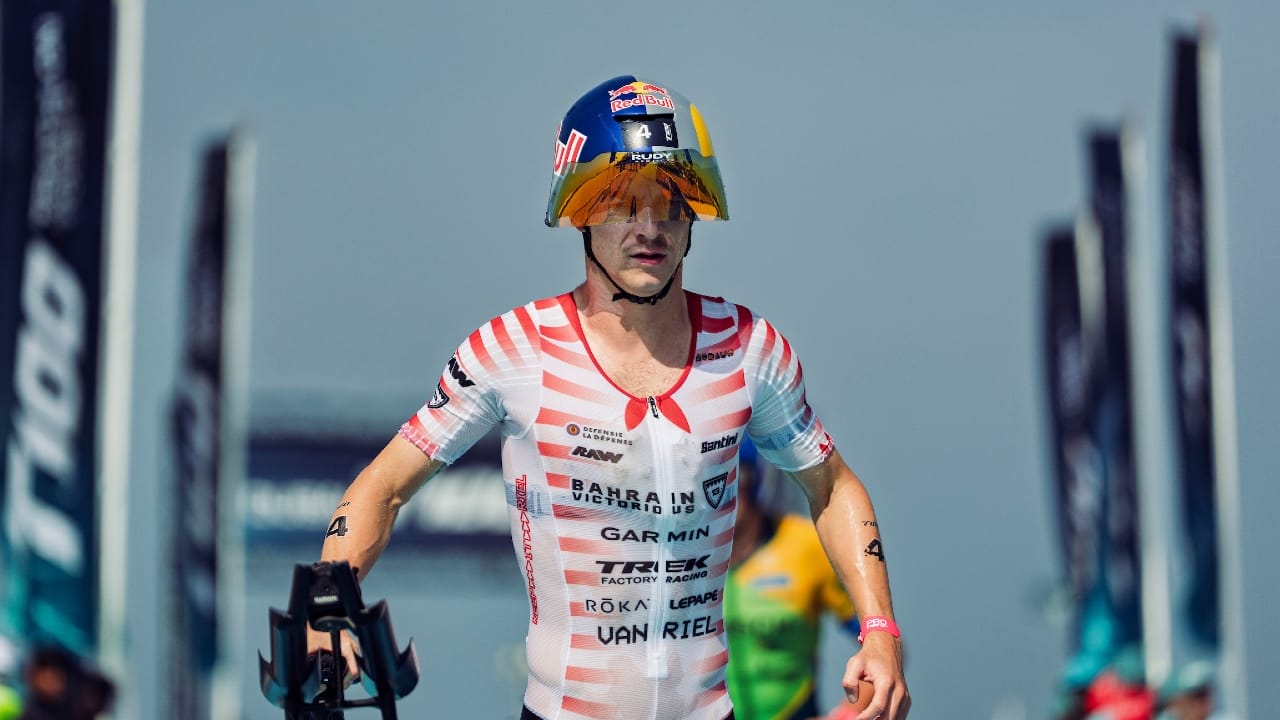
Qatar represents the Grand Final of the 2025 T100 Triathlon World Tour and a chance for the PTO to bounce back and end the season on a high.
The bike drama
But in terms of adding plenty more detail as to exactly what happened in Dubai, here’s our Q&A from Thursday afternoon with Sam Renouf:
TRI247: We’ve had the statement so let’s drill in to some details and do this chronologically, starting with the bike. I appreciate that the onus there was much more on the athletes. But was anything different? Were there any systems that were different in Dubai this time at all?
Sam Renouf: So not different but I think what we take away from it is the learning exercise that when you do have a complicated course – a point to point to start and then multiple laps – that creates complexity and we as an organisation need to recognize that athletes are racing really, really hard. So whilst yes from the overall rules of the sport, the onus is on them, we still need to make it easy to comply with that. And so I think that’s the main takeaway we’ve had. We’ve obviously done other events that have many, many laps and haven’t ever used a lap counter outside of our events in Miami where it was so many laps on a NASCAR course. But outside of that we haven’t had lap counters, we haven’t had bells, we haven’t needed those kind of things. But I think the lesson we’ve taken away from this is let’s make it as easy as possible for the athletes to do what they do best, which is perform. We are as frustrated as anyone in this because we feel we’ve let ourselves down and have let the sport down because we hold ourselves to a very high standard, just like the athletes hold themselves to it too. And so whether it’s an athlete error or ours, we kind of look at it all the same. And so moving forward we will be looking at ways that even if we have complicated multi-lap courses, how can we help the athletes get through and not have any risk of errors.
TRI247: Were there any failsafes out on the course to communicate to Hayden, Mathis and Marten once they had gone onto that extra lap? And would it have been safe to try and get them to turn around, for example?
Sam Renouf: I mean the simple answer is it isn’t safe, you’ve actually hit on the root of it. We don’t want them to stop and turn around, it’s actually pretty dangerous. The only bikes that were out there were from the broadcast and not necessarily a natural way to get the message across. I think it’s not a defense, it’s just sort of, that’s a reality of where the sport is. I think we’d like to get to a point where maybe there is an easier way to do two-way communication with the athletes so they know about it. But at the moment the technology doesn’t exist.
TRI247: Final one then on the bike. We had Hayden and Sam Dickinson both saying they had 76km on their computers. I see Vincent Luis’ Strava was 77.7k. Where did that missing distance go because that probably added to the confusion a bit?
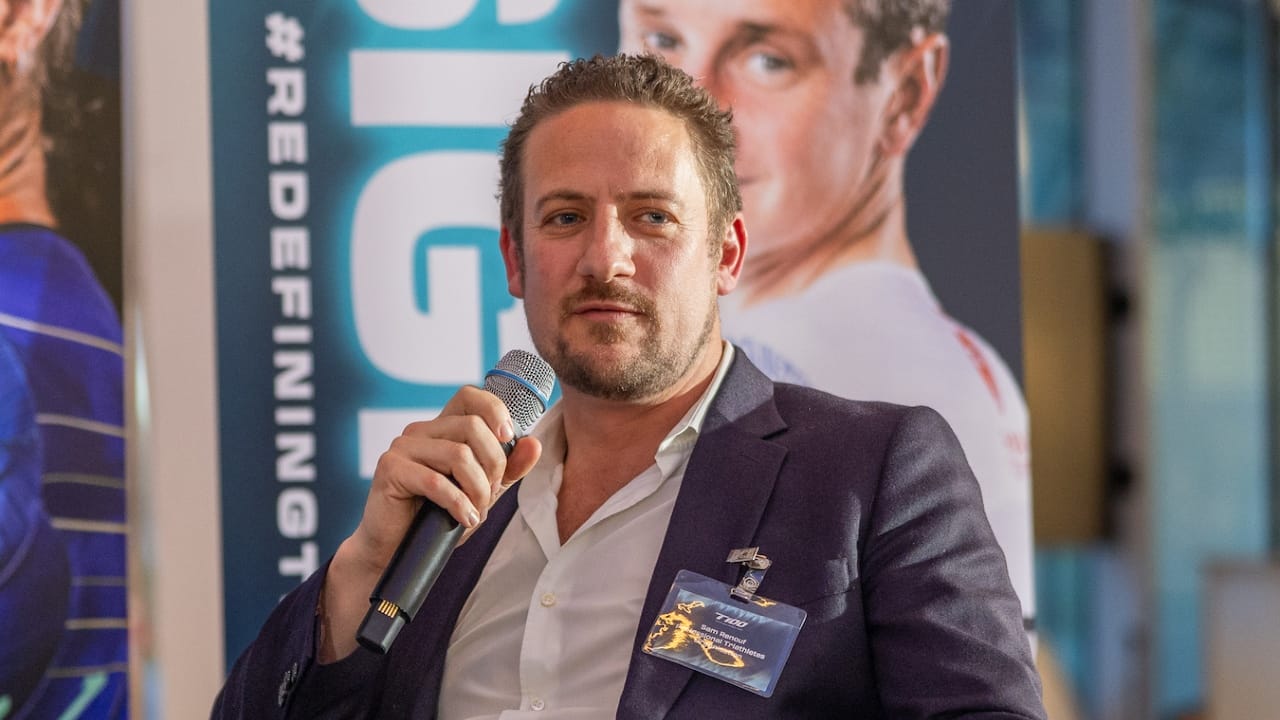
Sam Renouf: I think that’s as simple as differently calibrated GPS. When you’ve got a course with a lot of corners, you’re going to have some element of 50 metres, 100 metres between different GPS units. And so when you have that many corners that’s what that would account for. I think if we were off by 10km it would be a bit more of a concern. And we’d be like, where’s that missing distance gone? But there’s going to be a margin of error with the GPS readings.
Preserving the race
TRI247: Right, so let’s now go on to the run and the first question there, it was a short lap, were there any officials out there on the laps who could communicate with the athletes at all?
Sam Renouf: So there are officials out there but there are actually very, very different issues with the run. This is one of the things that has compounded the situation for everybody – two completely different things happened. Athletes doing too many or too few laps, and in the case of the first part of that, whether it’s poor signage or athletes not looking as closely, they did an extra lap on the bike. But in the second instance with the run, we had a technology failure which actually caused the signage to say stop early. So a completely different issue, which frankly, having an extra official there at that point may not have even helped because if you’ve got a big screen saying turn right, you will do. And one of the reasons why we made the change with the race jury to take the result from the seventh split was because we very much took that as this was the PTO’s error. And so what do we do to mitigate for that? Which is why we work with World Triathlon and the race jury and ultimately the athletes themselves to say this was our fault, this is a problem. How do we maintain the sanctity of the series as obviously all these athletes are racing towards points for Qatar. And we were fortunate that within World Triathlon’s rules there is a process that if technology fails, you can take a timing point. And we were lucky that the most recent timing point was relatively near the finish on the seventh lap. But for that issue, we absolutely own that it was our error from a technology perspective. So technology failed. We didn’t have a failsafe to check it. So we should have seen that earlier, which we didn’t. So that’s obviously something we can implement. And then secondly, there are just manual steps that we will add now of having a bell lap, having someone there that doesn’t exist in our protocol at the moment. It hasn’t needed to. But given we’ve had this very high-profile issue, we’ll be implementing those moving forward.
TRI247: You used the word ‘lucky’ then, Sam, in terms of that seventh lap time. What was also lucky was that Morgan Pearson was ahead at that point because it could have been even more awkward, couldn’t it, had he not been at that point?
Sam Renouf: Yes, but maybe lucky isn’t the right word to use other than that we looked at the results and said, look, what is the way that we can preserve this race? If you look at the data, this would stand up to any sort of normal person that, you know, it may not be perfect, but we have an outcome here provided the athletes and ultimately World Triathlon agree. Because we do see our governance to World Triathlon and we think that’s the right thing to do. That’s not an excuse. I say that to people very often. We occasionally get complaints by people saying, oh, you’ve given up too much control to World Triathlon. But to us, it isn’t a question of control, it’s a question of rules and governance. And we’re not a governing body. We’re an athlete association that’s putting on races. We don’t want to go and create our own rule set. We don’t think that’s the right way to take the sport. But it does mean we cede some of the responsibility on these kind of things. We thought that the outcome of the race jury was the right one but obviously it took a bit of time to process because there were so many factors involved. But at the end of that, we think we ended up with the best result from the outcome.
TRI247: So you’ve referenced ‘rules’ a couple of times there. Where did you have that flexibility to then have what appeared to be almost a vote from the athletes as to whether the 13 who did a lap short got disqualified?
Sam Renouf: So, yeah, this is actually a good thing to touch on. I think it’s been slightly misreported on social media as being a vote. It was more that we went to the athletes to get their perspective. So the athletes don’t vote on an outcome of a race. Right. That falls under the race jury to decide. But we as an athlete body thought it would be important to go and speak to the athletes and get their feedback in the process rather than just dictating to them. And other organisations or other sports might be a bit more black and white in that sense of saying, look, this is the outcome. But we think it’s really important, as the athlete body, that we take the athlete feedback on board because it’s important to who we are. So the outcome wasn’t based on a vote from the athletes. The race jury took athlete feedback into account in making their decision which led to the results.
The live broadcast and social media
TRI247: Okay, just one other quick question before we move on, what about the links with the commentary box? And I appreciate this is primarily about the athletes but in terms of people watching the broadcast you have said you want to be compared to tennis, to golf, to F1. But there didn’t seem to be much co-ordination there. Jan [Frodeno] was saying ‘the tracker says Mika Noodt has won’ so then he and the majority of people watching think it’s Morgan Pearson who is in the wrong and doing an extra lap. Is that something you look at going forward as well? To co-ordinate that better and help Jan and Matt [Baker] out?
Sam Renouf: Definitely. So the simple answer is it’s around communications between race control of what’s happening and then broadcast as the mouthpiece for everyone who sees it. And we take that really seriously and we’re very sorry for all of the people that engage with the product and then ultimately feel let down. Because if you think about it, to us the broadcast is to a certain extent a transaction. People are giving us their time to be entertained and we let them down if we don’t entertain them well and provide the results in a timely manner. I don’t question the race jury – and actually the process to get the results was actually relatively quick considering all the things that went through. But being able to get regular updates on ‘this is what’s happening’ and being a bit more open about the process, I think it’s something we all assess moving forward and how we can improve that. Put simply, it adds drama to the broadcast but it needs to be told in the right way and people need to understand what’s going on.
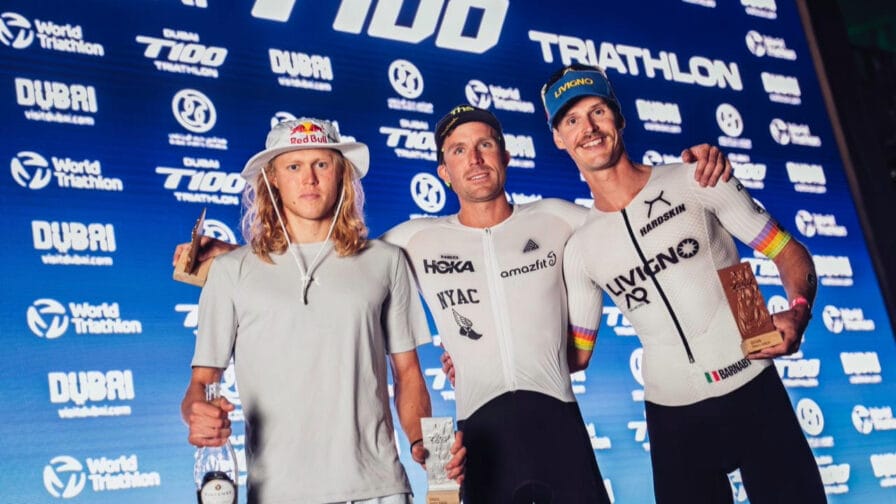
TRI247: In terms of your social media, there seems to be quite a contrasting reaction to what went out on Instagram. Are you comfortable with that?
Sam Renouf: So I think, the line I would take is we will never muzzle or censor athletes from what they want to speak about. We may not necessarily agree with all of what the athletes say about us or about what happens, but we’re not the kind of group, and we never want to be known as someone that intimidates the athletes not to speak out because we just don’t think that’s the right approach to take. I might not be thrilled to see athletes criticise us, but, it’s absolutely their own volition to do so, and we don’t hold them back from doing it. I think things are said in the heat of the moment, which we completely understand, because people are frustrated, there’s money on the line, they’re going through a lot as athletes. And so we take the criticism on board, we then go speak to them afterwards. I think a lot of this is about maintaining a communication between the athletes and us so that we can ultimately take the sport forward. Without sounding too much like a politician, that’s ultimately our goal. But you won’t see us as a group saying ‘don’t post on Instagram’ to the athletes. That’s just not the attitude we think we should take.
TRI247: Great. No, I totally agree. And I apologise as I probably didn’t make my question clear. I was more thinking in terms of your own social media that some of those clips – the extra lap or the early finish, they went viral. There’s the argument that all publicity is good publicity but are you comfortable with how that was handled?
Sam Renouf: I think we will look at some more checks and measures for when things are unknown. I think we can’t stay away from controversy. That’s part of sports, and I think publicity in that sense is good. But we certainly don’t want to be highlighting errors if they weren’t. We don’t want to bring negativity, put more fuel on the fire with negativity. So I think we would put some checks and measures in place where things like that have occurred that we maybe don’t know the outcome yet just before promoting them more.
Looking forward
TRI247: Final few questions then. We’re now talking on Thursday afternoon. This all happened on Saturday. Are you comfortable that it’s taken a little while to speak publicly about it all?
Sam Renouf: Well, so I suppose it depends when you say it takes a little bit of time. Over the weekend, we were delivering the rest of the results and have spoken to the athletes since then. Each day things are happening around the event. So to us, this will be an open dialogue with the sport. We very much take the feedback about positive and negative. We take it all. And we want to learn from what people are telling us about what they see as good things the PTO are doing and bad things the PTO are doing.
TRI247: You’ve already said you’d never want to stop athletes from speaking about events, but there does seem to be, by and large, an understanding of the bigger picture for the sport of triathlon that it really is in everyone’s interest for you guys to thrive, going forward to Qatar. That’s got to be the sort of mentality for the next few weeks, hasn’t it?
Sam Renouf: Yes. And again, that’s been really nice to see. We’re not going to stop athletes criticising us but equally we’re thrilled to see athletes stand up and say, well, look, let’s step back a bit. We had a horrible weekend. Horrible for us, horrible for the athletes, horrible for the sport, because no one wants to see things not perform well. But, let’s not take it out of context of how much the sport has progressed over the last few years. And we’re only one part of that. We’re not the only thing that’s driving the sport ahead, but the sport is progressing really well. I think in our case, we are growing as an organisation, the events we’re putting on and the scale of what we’re doing, really, really quickly. And this is a good example of growing pains, unfortunately. And so we have to make sure as an organisation, we learn from mistakes, we put in the processes so that they don’t happen again, and we keep marching forward. Because our goal, as you said earlier is to aspire to be like Formula 1. And, you know, things do happen in those sports, too, but they also get fixed and you move forward and progress.
TRI247: And final one for now Sam is I’m sure you’ve seen the ProTriNews podcast [‘they’ called for him to be fired], what’s your reaction to that – you’re not going anywhere, are you?
Sam Renouf: I’m not going anywhere anytime soon, no. Yeah, I did listen to their podcast this morning and I had some interactions with them about it. Look, everyone’s open to their own views, and I’ve said I’m more than happy to go on their podcast and talk about what I think we’re doing well, what I think we haven’t done well. This has been a challenging year for the PTO. This is a reminder of it, but it’s not the first thing that we’ve had a challenge with this year. Equally, we don’t think it’s been a year of negativity – there have been positives and negatives. I think it’s perhaps been surprising to me how vocal some of the criticism has been on this. But that also shows the passion that’s in the sport. We all believe this can be a lot bigger than it is and we just need to harness that passion to be positive rather than negative.








